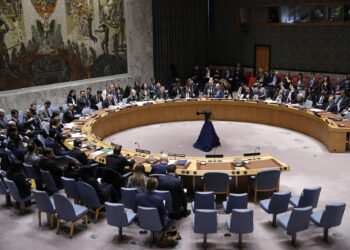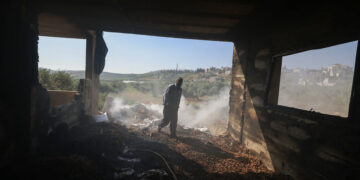Sayed Ahmed Alwadaei is the director of advocacy at the London-based Bahrain Institute for Rights and Democracy (BIRD). He has written for The New York Times and The Washington Post.
Thirteen years ago, the smallest country in the oil-rich Gulf region witnessed the start of some of the largest protests of the Arab uprisings, per capita, as almost a third of Bahrain's citizens took to the streets. The protesters were demanding democratic change and calling for an end to the complete control of the Al-Khalifa family, which has ruled the country for two centuries. I was among them.
The revolution that swept through Bahrain in 2011 was crushed by the regime with the support of its allies not only in neighboring Saudi Arabia but also in Washington. Given Bahrain's tiny population, with just over half a million nationals, the death toll per capita from the protests was also one of the highest of all the Arab uprisings. Since then, an even more repressive regime has tried to bury the memory of that revolution and imprison as many of its participants as it can.
Today, Bahrain is the only Arab country that has joined the U.S.-led coalition in its operation in the Red Sea to deter the Houthis from attacking Israeli and other commercial ships. No one in Bahrain can speak about or question the state's decision. When leading opposition activist Ebrahim Sharif dared to on social media, questioning the "unelected" government acting "without any consideration for the position of the Bahraini people who strongly support our besieged Palestinian people," Sharif was detained for a week.
An even more repressive regime in Bahrain has tried to bury the memory of the 2011 revolution and imprison as many of its participants as it can.
- Sayed Ahmed Alwadaei
While more than 12,000 children have been killed in Israel's war in Gaza, the Al-Khalifa regime has defied the calls of Bahrainis marching peacefully in the streets since October, demanding that Bahrain cut ties with Israel. Instead, the authorities have arrested dozens of people, including at least 25 children, in connection with those protests.
Bahrain joined the United Arab Emirates in normalizing diplomatic relations with Israel in 2020 under the Abraham Accords. Even in the face of genocide in Gaza, Bahrain's bond with Israel remains unbroken. What else could possibly change the regime's position?
This is another legacy of the repression of 2011. Bahrainis endured the bloodiest time in their country in over a century, as the state gave its security forces a free hand to kill protesters—some in the street, some in custody. One of them, Kareem Fakhrawi, was the co-founder of the only independent newspaper in Bahrain, Al-Wasat, which was later shut down by the government in 2017, part of what Amnesty International called an "all-out campaign to end independent reporting" in the country.
Bahrain has turned into a more sinister and sophisticated police state with a brutal security apparatus and entrenched laws to punish any dissent. Daring to criticize King Hamad will land you in prison for seven years.
But Bahrainis have not given up. Last August, the country's Jau Prison witnessed a mass hunger strike of 800 inmates, mostly political prisoners, demanding an end to their degrading treatment, including being confined to their cells for 23 hours a day for many years. The strike lasted for 36 days until the government conceded to some of the strikers' demands, pledging to improve conditions in the prison. The timing coincided with a visit by Bahrain's crown prince, Salman bin Hamad Al-Khalifa, to Washington, where he signed a new security agreement with the United States.
Those who led the uprising in 2011 continue to languish behind bars. I remember, in February 2011, seeing one of those leaders in Pearl Roundabout, the center of the protests in Manama. Sheikh Mohammed Habib al-Muqdad, a prominent Shia religious leader and a leading opposition figure who also ran an orphanage center, had been released from prison earlier that month after King Hamad, in a bid to quell the mass protests, had ordered the release of several prominent political prisoners under a royal pardon. Al-Muqdad, who also has Swedish citizenship, had been arrested in 2010 on politically motivated charges. His freedom provided a jolt of hope that the revolution could succeed. In Pearl Roundabout, he was showing a journalist the marks of electric shocks on his body, the torture he had endured in regime custody.
Al-Muqdad's freedom didn't last long. He was arrested again in April 2011 and later sentenced to 68 years in prison. Recent pleas to the Biden administration to secure his release have fallen on deaf ears.
When I was detained myself in 2011, I stood waiting in the corridors of a military court to be presented before a judge. A man was dragged in by officers; it was al-Muqdad. He was humiliated in front of other detainees. I remember one officer said to us, "I wish you all to receive the death sentence for betraying your country."
In his later testimony in another court appearance in 2012, al-Muqdad described 50 methods of torture he had endured, including sleep deprivation, the use of electric shocks, and guards spitting in his mouth and forcing him to swallow it.
Thirteen years ago, the United States took a side in Bahrain, deciding that the Al-Khalifa regime had to survive, no matter the costs to Bahrainis themselves.
- Sayed Ahmed Alwadaei
Like al-Muqdad, Abduljalil al-Singace, a leading Bahraini academic and engineer, was also imprisoned in 2010—in his case, upon his return to Bahrain from London, where he had spoken at the House of Lords about human rights abuses in Bahrain. Although he was also released in King Hamad's pardons in February 2011, al-Singace was among the first to be rearrested when martial law was declared weeks later in March. His account of torture was documented by a commission established by the king in the uprising's aftermath (its recommendations for accountability for abuses and the release of those wrongfully imprisoned were never fully implemented, despite promises from the king).
Al-Singace has suffered from the effects of poliomyelitis since birth and requires crutches to walk. Authorities used his disability against him—confiscating his crutches, making him "stand on one leg for prolonged periods"' and pushing his crutch "into his genitals," as the Bahraini government's own torture commission documented. The commission also found that the authorities "threatened him with rape and made sexually explicit comments about his wife and his daughter," and that he was subjected to nightly beatings for two months while being held in solitary confinement.
For the past two and a half years now, al-Singace has been on a hunger strike to demand the return of his hand-written manuscript, a study of Bahraini dialects of Arabic that he has spent four years researching behind bars, which the prison authorities confiscated.
Bahrain's Western allies point to so-called "progress" in the kingdom, especially after its diplomatic normalization with Israel, even as it whitewashes its human rights abuses. Last year, the British government removed Bahrain from its human rights priority countries following a £1 billion investment pledge in the U.K. economy. The Biden administration has called Bahrain "one of the United States' closest partners in the Middle East" and claimed that "promoting human rights" was an "important topic of discussion" during the crown prince's visit to Washington last fall.
The West has been complicit for too long in enabling the abuses of Bahrain's regime. Thirteen years ago, the United States most of all took a side in Bahrain, deciding that the Al-Khalifa regime had to survive, no matter the costs to Bahrainis themselves. Yet despite the intense repression, Bahrainis continue to march in the streets—in support of Palestine and to demand the release of those still behind bars. As torture has failed to break their will, resilience endures.






































